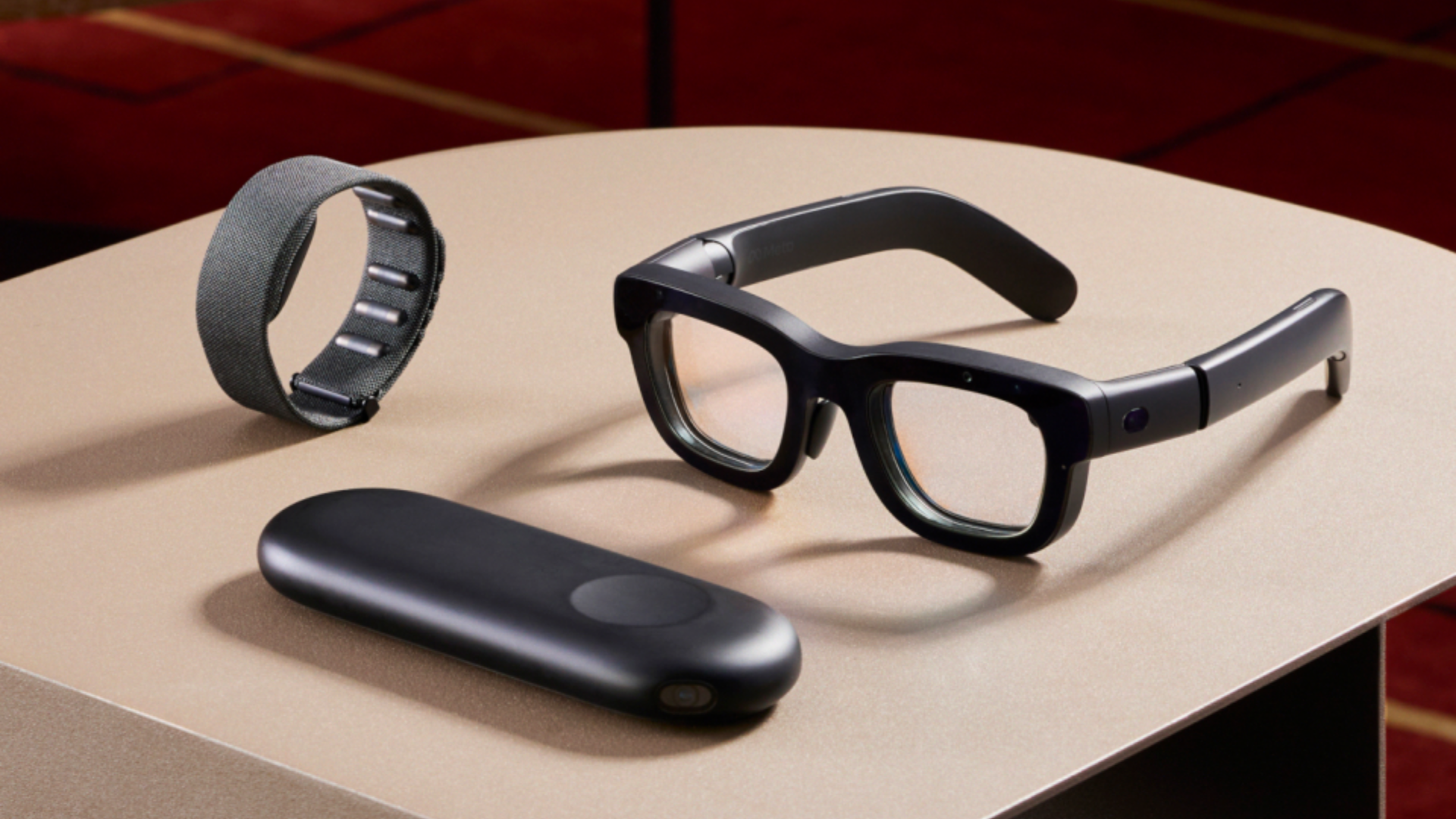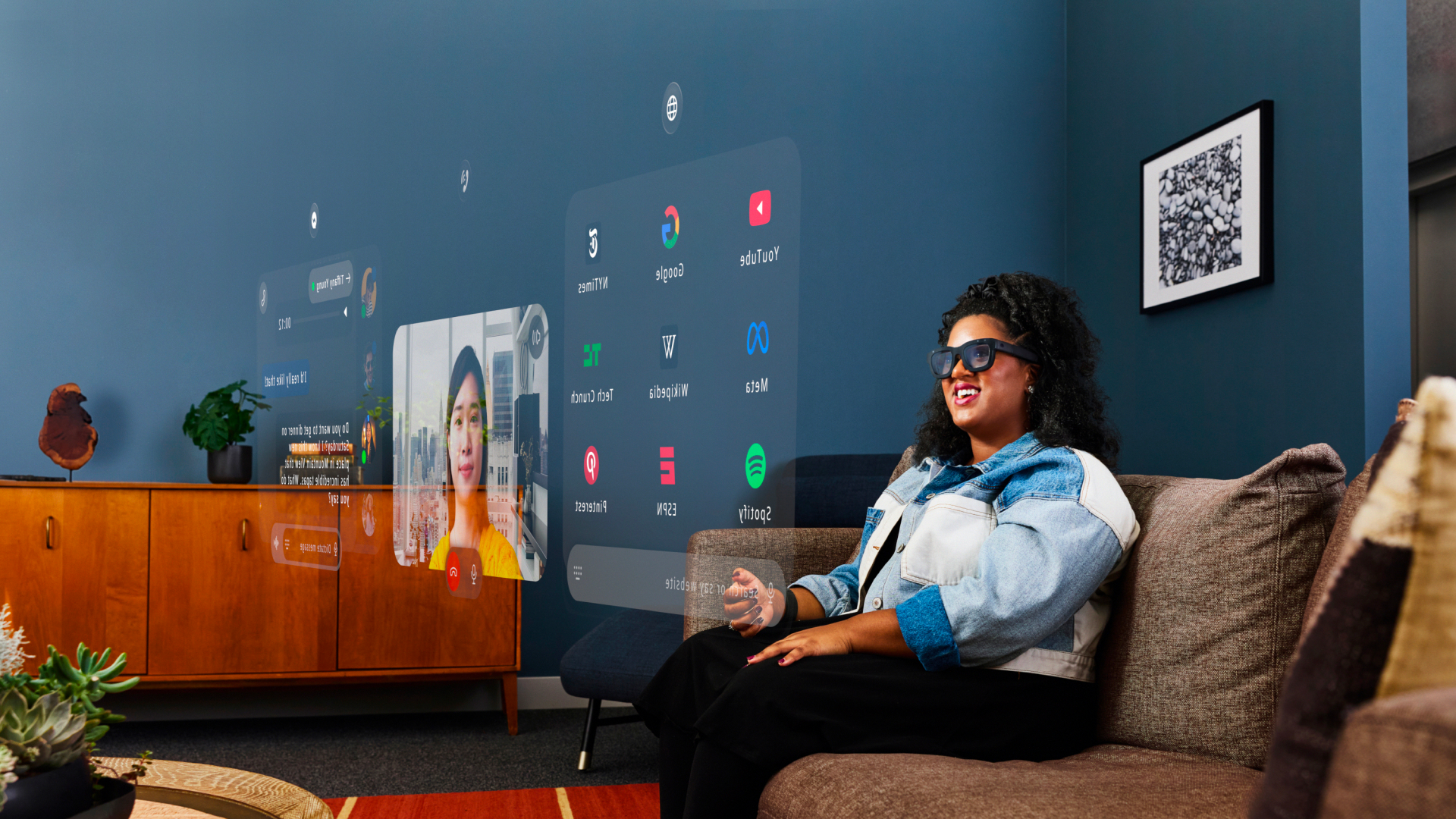Meta Orion AR Glasses: the latest news on the game-changing prototype, and when we might see a consumer version
Meta's smart glasses are gonna get smarter

Meta’s long-awaited AR glasses have broken cover with it showcasing the Meta Orion AR glasses – a prototype pair of specs that CEO Mark Zuckerberg believes will change the tech landscape when the consumer version launches at some unspecified point in the future. And based on what we've seen they could be the world's best AR glasses when they launch.
We’ve had the chance to try the specs in a Meta Orion hands-on demo, and suffice to say we’ve been blown away. They’re not quite perfect yet, but Orion teases a potentially incredible consumer product when it launches.
But when could that be? And how much might Meta’s AR glasses cost? What specs and features will they even offer? Based on leakes, rumors, official information – such as from Meta’s own Meta Connect 2024 event – and a little speculation we’ve done our best to answer all of these questions about the Meta Orion AR glasses below.
Meta Orion AR Glasses: Price
So technically, Orion won’t ever go on sale; it’s a prototype that only select Meta staff, AR software developers, and those lucky enough to secure a demo will likely ever get to use, let alone own. Semantics aside, we already have an idea of how much the consumer version of Orion will cost when it launches. Unfortunately, it won’t be as cheap as Meta’s other XR tech and glasses.
When Mark Zuckerberg unveiled Orion, he also outlined three objectives Meta is aiming to achieve before the glasses get released to the public. One is to “make them more affordable” (via Meta) by using practices like building Orion at scale. When we heard "affordable" we hoped that meant somewhere in the region of the current Ray-Ban Meta smart glasses – which start at $299 / £299 / AU$449.

Alas, this has been clarified by Meta CTO Andrew Bosworth. In an Instagram AMA in he explained that the AR glasses “probably won’t get in at, like, a Quest 3S price point, or even a Quest 3 price point” – which instantly prices them over $499.99 / £469.99 / AU$1,049.99. Instead the team is aiming at the price of phones and laptops which suggests somewhere around $1,000 (£800 / AU$1,600) – which is reportedly the price Meta is aiming for its Hypernova glasses (a half-step between its current Meta Ray-Bans and Orion) to cost.
This certainly makes more sense given how impressive Orion was sounding, though it does mean we might have to wait a while longer for a truly affordable model to come along.
Get daily insight, inspiration and deals in your inbox
Sign up for breaking news, reviews, opinion, top tech deals, and more.
Meta Orion AR Glasses: Release date
Speaking of waiting, if you’re looking to get your hands on the consumer version of Meta’s Orion AR glasses prototype then you’ll need to be patient as they aren’t expected to drop until around 2027.
This was the year Meta reportedly planned to launch AR specs according to an internal roadmap that The Verge leaked back in early 2023. This has since been supported by a more recent leak that says Meta plans to launch “Artemis” AR glasses (consumer versions of Orion) in 2027 – though it still needs to overcome a few design, pricing and manufacturing challenges first so an early release isn’t likely. Lastly, Meta’s own CTO Andrew Bosworth revealed the release timeline is in the region of “a couple years, but not decades” – again pointing to a 2027-ish launch date.
Assuming Artemis/Orion aren’t delayed, our best bet for a more specific launch date is October 2027. Meta usually likes to release new tech in the weeks after its annual Meta Connect event which is generally in late September, so an October launch would follow the same pattern we’ve seen for its recent Meta Quest headsets and Ray-Ban smart glasses. Meta could always choose to mix things up but we’re not expecting it to.
Meta Orion AR Glasses: Design and features
As a prototype, Orion’s design hasn’t yet been finalized, and it’s actually one of the aspects Meta has said it wants to optimize and make more fashionable before launch. However, that’s not to say we don’t have an idea what Orion’s final form might look like.
Firstly, Meta has said it wants to slim down the glasses and keep them light. Considering Orion is already just 100g we expect the consumer version will be equally light (or lighter), and hopefully a lot less chunky – though hopefully it can do so without sacrificing battery life, which currently sits at two to three hours.
We also expect that the glasses will take design cues from Ray-Ban glasses. Meta recently announced the continuation of its partnership with EssilorLuxottica (Ray-Ban’s parent company), and it tracks that Meta would want to adopt the fashionable classic Ray-Ban style for its AR glasses and not just its AI smart glasses.
Meta might need to avoid creating clear consumer Orions like it has with the existing Ray-Ban Meta smart glasses. CTO Andrew Bosworth has a special clear pair of Orion glasses, but revealed that because their design necessitates a non-magnesium frame, the clear pair have significantly worse heat distribution properties. As a result, the clear pair “thermally tap-out” in about 30 minutes instead of lasting the full two to three hours.

As for features, we know Orion boasts AR and AI tools. AR-wise we’ve seen hints of the sorts of experiences it can facilitate like giving you floating windows for virtual multitasking, the ability to have AR video chats, and we imagine there will be an AR game or two at launch (here’s hoping for a fully AR Pokemon Go).
On the AI side of things, expect to see everything currently possible on the existing Meta Ray-Ban smart glasses such as Look and Ask, as well as the new photographic memory and real-time translation tools. Plus we expect several other AI tools will launch in the coming years that Orion should also possess.
Meta Orion AR Glasses: What we want to see
Transition lenses by default

For glasses wearables to take off they need to work in all weather, and the only solutions to this are high-quality transition lenses or a frame design that allows you to easily swap between clear and shaded lenses manually – lenses which would have to be separate to the AR displays.
We love the Ray-Ban Meta smart glasses, but the smart sunglasses aren’t usable indoors or on days when it isn’t sunny. Conversely, smart glasses with only clear lenses won’t serve you well when it is a bright day and you want to protect your eyes. As a result, the only sensible smart glasses solution will give you a wearable that can work in any weather.
AI capabilities everywhere at launch
The biggest let-down of the Meta Ray-Ban smart glasses is the AI features shown off at their 2023 announcement weren’t available at launch, and still aren’t available in every region they’re sold. Without these AI tools the glasses just aren’t as impressive.
When Orion’s consumer version makes it to market Meta needs to make sure that every feature it announces for the specs is available everywhere when the AR and AI glasses release (or at least within a couple of months).
Apps, Apps, Apps

The main issue most XR hardware struggles with is not its specs, but its software. No matter how impressive the gadget might be technically it’s useful if it doesn’t do anything to justify those specs.
For Orion to be a success, Meta will need to ensure it’s well-stocked with AR software and features at launch – which is perhaps why Meta plans to give software makers Orion prototypes as dev kits to aid them in their AR app-making efforts.
A SIM card slot, and phone connectivity
Mark Zuckerberg might envision AR glasses as the evolution of smartphones, and so it would be neat to see them able to access a network completely independently of your smartphone – like an LTE smartwatch – but we’d like the Meta Orion glasses to play nice with phones too.
This includes piggybacking off their network if you don’t want to get a second SIM, and also being able to perform actions like streaming video and audio from your phone, for when you want to swap between watching on the screen and on a heads-up display.
The latter point might seem like an obvious inclusion, but other recent AI-powered so-called smartphone replacements have taken measures to separate themselves from smartphones, much to their detriment. Smart glasses might replace phones one day, but for now they’ll gain a heck of a lot by working with smartphones, rather than against them.

Hamish is a Senior Staff Writer for TechRadar and you’ll see his name appearing on articles across nearly every topic on the site from smart home deals to speaker reviews to graphics card news and everything in between. He uses his broad range of knowledge to help explain the latest gadgets and if they’re a must-buy or a fad fueled by hype. Though his specialty is writing about everything going on in the world of virtual reality and augmented reality.
You must confirm your public display name before commenting
Please logout and then login again, you will then be prompted to enter your display name.
